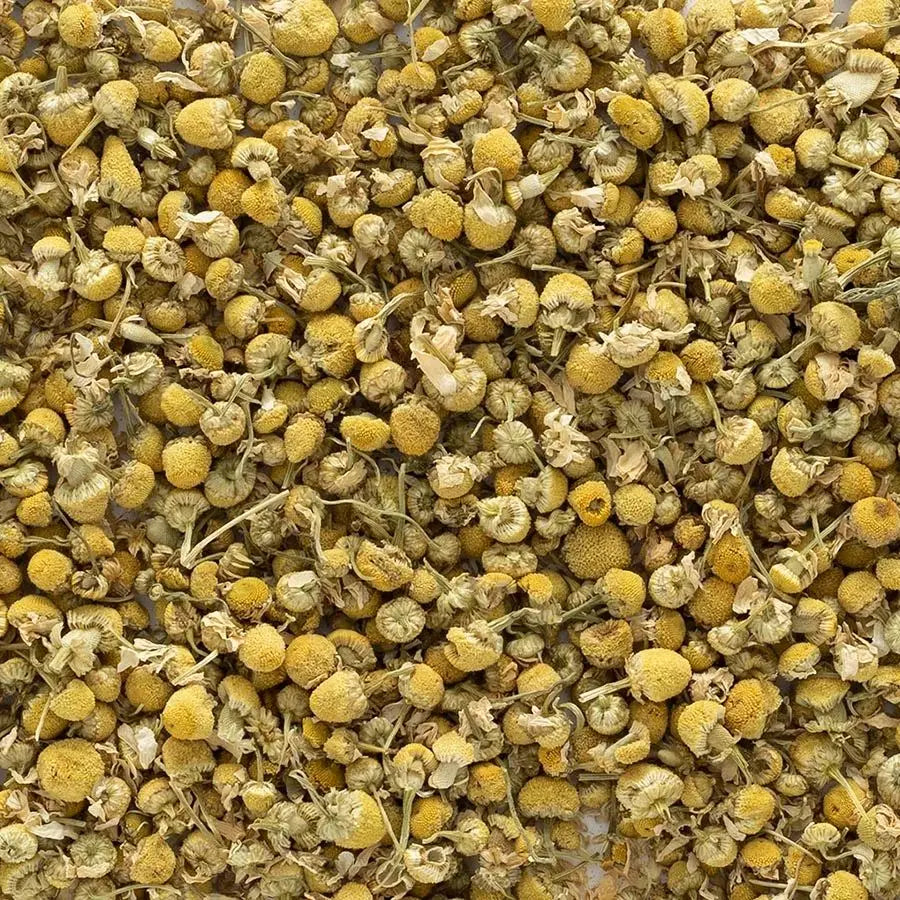THYME & SAVORY
Organic German Chamomile (Matricaria recutita)
Organic German Chamomile (Matricaria recutita)
Couldn't load pickup availability
Dried whole chamomile flowers are known for their powerful apple-like taste and relaxing properties. Chamomile has a pleasant effect on people. Not only is it an attractive herb with an agreeable apple-like aroma, it's also a great choice for a relaxing, calming cup of herbal tea.
Chamomile flowers are most commonly used for tea but can be utilized in a variety of ways. Use chamomile as a part of your DIY shampoos, conditioners, lotions, bath blends and other skincare products. The sweetness of chamomile flowers makes them the perfect match to include in desserts and blended drinks, or to liven up breakfast by mixing them into oatmeal or cereals.
To prepare as a tea, pour 8 oz. boiling water over 2 tsp. of herb. Cover and steep 5-10 minutes, strain and serve immediately.
a.
quick look
information at a glance
| approximate cups to one pound | 21 |
| origin | egypt |
| plant part used | flower |
| processing | whole |
| agriculture | organic |
b.
buying & keeping
general guidelines and tips
| storage tips | Store in a sealed container in a cool, dark place. Chamomile should be stored at temperatures below 63°F. |
| appearance & aroma | Delicate flowers with a mild scent. |
c.
uses
try something new
| cosmetic | Use to make infused oils for salves, lotions, lip balms and other cosmetics. |
| decorative | Whole chamomile flowers look pretty in floral displays. |
| culinary | Add the whole flowers to chicken or vegetable broth. |
| wellness | Use in teas and digestive tonics. |
| household | Spray a strong (cooled) tea of chamomile on garden seedlings to help prevent damping off. The tea also acts as a compost activator. |
d.
flavor profile
organic, whole
chamomile flower
Chamomile has a mild flavor that blends well with citrusy, floral or mint-flavored herbs.
e.
formulas & recipes
organic, whole
chamomile flower
Herbal Spa
DIY Chamomile and Elderflower Hand Gelf.
what else you should know
organic, whole
chamomile flower
This species of chamomile is also called German chamomile to distinguish it from another plant known as English or Roman chamomile (Chamaemelum nobile syn. Anthemis nobilis). Although the two are different species of plants, they both belong to the daisy family and have similar properties.
Other common names for German chamomile include Hungarian chamomile or blue chamomile, the latter being a reference to the blue oil produced by steam distillation of the flowers. The plant is native to Europe and northern Asia, and is commercially cultivated in France, Egypt and Hungary.


